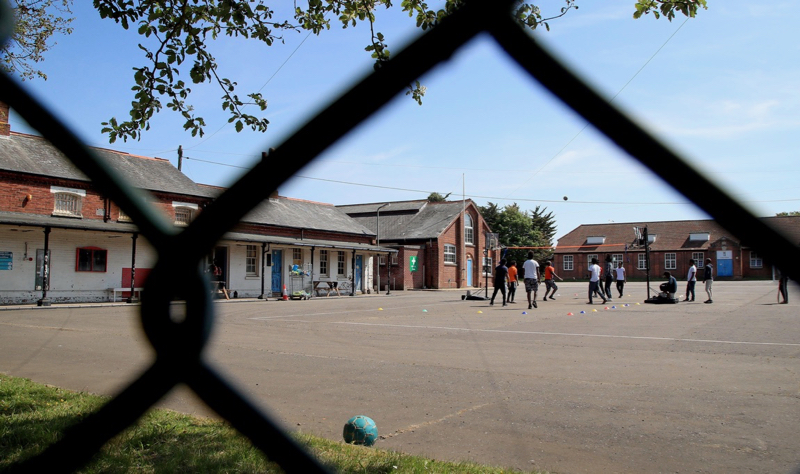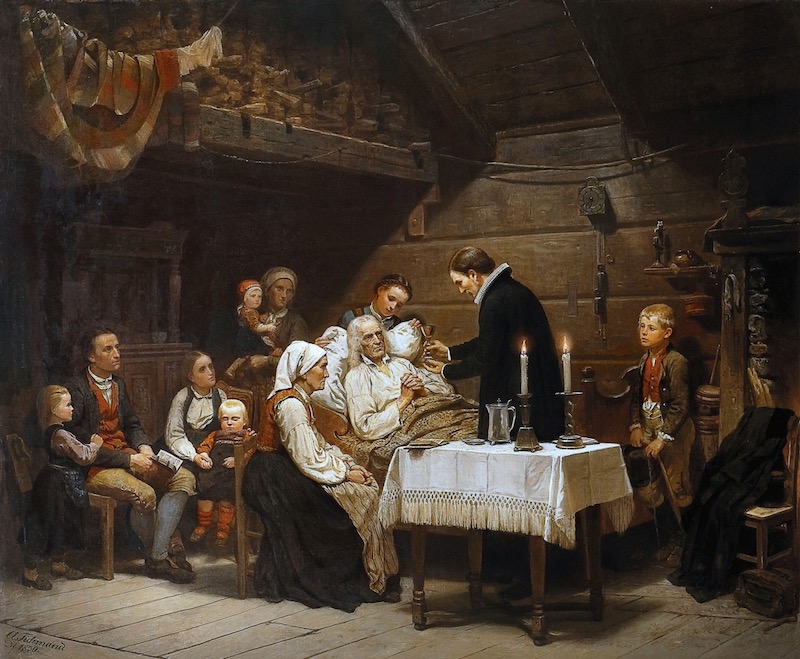It's one-thirty in the morning and the phone goes. It's the hospital. Somebody is at “end of life”. The family would like a priest to come. I ask: “Is the patient conscious?” “No.” I ask: “Are the family still there?” “No. They've just gone.” The scenario is obviously not a recent one. For most of the last 20 months priests have been not only been banned from visiting nursing homes but also persona non grata in most hospitals – unless they are on the official chaplaincy team, which I'm not.
But should I go? (I hasten to add that I usually do.) And what to do when I get there? One option is to anoint with the Oil of the Sick, using a shortened Rite which repurposes a line from the Letter of James about “sending for the elders of the Church” (Greek: presbyteroi, but “priest” in the English Ritual) and speaks of the prayer of faith “saving” the sick person and the Lord “raising them up”. Such anointing is meant to be a sacrament of healing but often feels like a festival of euphemism, especially in a life's final hours. And how does the sacrament point beyond itself when the only people present are unconscious patient, priest and monitoring medic?
Sacraments work “ex opere operato”, of course, according to traditional Catholic theology: it's the doing that does it. And you certainly don’t go to the hospital in the wee small hours for the feel-good-factor, but simply to be with someone in their extremity, treating them as subject when they have themselves lost all agency. Once on the ward, any pastor worth his salt will assume the patient’s hearing still works even when all else has ceased.
Should anointing seem misplaced, given the prognosis of impending death, another option would be the Prayer of Commendation – perhaps bound round with other prayers, Absolution, certainly; Dei Profundis, Nunc Dimittis, a Rosary, maybe; all save absolution prayers the laity could pray – if we taught them how; each a sound traditional way of praying the dying into paradise.
Ironically, the absence of the family makes the Commendation option easier. When relatives are in the room, priests worry: is now too soon to tell a Christian soul to go forth from this world in the name of God the Eternal Father who created them? Our culture does not easily give space for conversations about death.
We do not wish to frighten the moribund – or maybe do not wish to disturb ourselves. So we euphemise. No one seems to die any more. People “pass”, a strange graduation from – for the most part – the University of the Third Age, yet one which still takes us by surprise each time.
Back, then, to the grieving family not waiting for me in the ward in the early hours. What's interesting is that, though they may not have been in a church since childhood – if then – they still know that ahead of death you “call the priest”. In fact, they probably still know that the priest will perform “The Last Rites”, without knowing what these are. And lovingly they know that this is what Grandma would want. There are people who retain this folk-memory and make the request; not always the regular attenders at Mass. The long-lapsed are among the most likely to “call the priest”.
What the relatives don't know is that, like most dying Catholics, the dying person will not get Viaticum, that final communion traditionally regarded as the appropriate final sacrament for those nearing death. They have probably lost their swallow-reflex and been long since labelled “Nil By Mouth”, perhaps sedated, too. Even supposing that they should miraculously open their eyes one last time, giving her communion might be a choking risk.
In contemporary Britain – or at least the Surrey suburbs where I dwell – “Send for the priest!” belongs, it seems, in fading folk-religion memories and some old novels, not among the basic reflexes of 21st century Catholics. I had an urgent knocking at the door the other day. Someone was dangerously ill nearby. Fear was etched on the face of the adult seeking my attention. Send for the priest? No, not that; but did I have a defibrillator on the premises?
Thank goodness for CPR, EpiPens, defibrillation and the myriad other means that bring back the near-dead and give them a few more years on earth. But perhaps we need to find ways of helping our folk to befriend, as well as postpone, their final journey. Yes, priests can play their part: anointing the sick before a crisis point is reached to help them face their illness in a safe, ritualised way; leading our communities in honest talk of death; freeing people from that old fell fear of dying “in a state of sin” – underlining ever and again that God is merciful and does not always need a priest's absolving words in order to untie the tangled knots of life. We need to teach people how to help their loved ones to die well without a priest, because that is what many, perhaps most, of them will do.
Fr Rob Esdaile is parish priest of Our Lady of Lourdes, Thames Ditton



 Loading ...
Loading ...
What do you think?
You can post as a subscriber user ...
User comments (0)